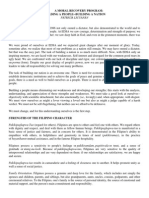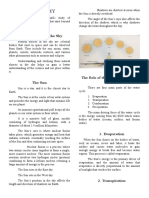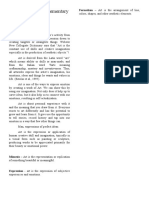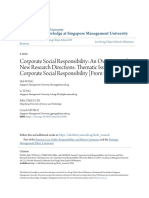Lecture in Ethics Filipino Values and Moral Development
Lecture in Ethics Filipino Values and Moral Development
Uploaded by
Anne BautistaCopyright:
Available Formats
Lecture in Ethics Filipino Values and Moral Development
Lecture in Ethics Filipino Values and Moral Development
Uploaded by
Anne BautistaCopyright
Available Formats
Share this document
Did you find this document useful?
Is this content inappropriate?
Copyright:
Available Formats
Lecture in Ethics Filipino Values and Moral Development
Lecture in Ethics Filipino Values and Moral Development
Uploaded by
Anne BautistaCopyright:
Available Formats
Filipino Values and Moral Sense of gratitude or utang na loob.
Very dependent on interpersonal
Development relationships; gives sense of security.
Strengths and Weaknesses of the Camaraderie and a feeling of closeness to
Filipino Character one another.
Pakikipagkapwa-tao is a foundation for unity as
well the sense of social justice.
Note: This material is from Filipino Values and
Moral Development published by the Economic
Development Foundations in November, 1992.
Family Orientation
The study was sponsored by the Philippine Senate
and was headed by Senator Leticia Shahani. It was Filipinos possess a genuine and deep love
conducted by a task force headed by Dr. Patricia for family.
Licuanan. The findings were based on
Source of personal identity, emotional and
bibliographic surveys and interviews and
material support and one’s main commitment and
consultations with researchers and practitioners in
responsibility.
the behavioral and social sciences, education and
social welfare, journalists and social analysts; a Honor and respect given to parents and
nationwide survey of 2000 respondents; and, elders; care given to the children; the generosity
focus group discussions among residents of an towards kin in need, and in great sacrifices one
urban poor resettlement area in Bagong Bayan, endures for the welfare of the family.
Dasmariñas, Cavite. From the study was
developed “A Moral Recovery Program-Building Sense of family results in a feeling of
a People, Building a Nation” submitted to the belongingness and rootedness in basic sense of
Philippine Senate. security.
STRENGTHS IN THE FILIPINO Joy and Humor
CHARACTER Filipinos have a cheerful and fun-loving
approach to life and its ups and downs pleasant
disposition, a sense of humor and a prosperity for
Pakikipagkapwa-Tao happiness that contribute not only to the Filipino
charm but also to the indomitability of the Filipino
Filipinos are open to other and feel one spirit.
with others regard others with dignity and respect
deal with them as fellow human beings. Laughing at ourselves and the mess we are
in is an important coping mechanism…playful,
Kapwa-tao = a fellow human being. sometimes, disrespectful, we laugh at those we
love and at those we hate and we make jokes
Basic sense of justice and fairness.
about our good fortune and bad.
Concerns for others.
Manifested in the Filipino’s love for
Ability to empathize with others. socials and celebrations, to laugh even in the most
trying of times…the result is a certain emotional
Helpfulness and generosity in times of
balance, optimism, a healthy disrespect for power
need (Pakikiramay); practice of bayanihan or
and office and the capacity to survive.
mutual assistance, Filipino hospitality.
Sensitivity to people’s feelings
(pakikiramdam). Flexibility, Adaptability and Creativity
Pagtitiwala or trust.
We can adjust and to adapt to Related to bahala na which may be
circumstances and the surrounding environment, considered positively as a reservoir of psychic
both physical and social; adjust tox whatever energy, a psychological prop on which we can
happens even in unplanned or anticipated events. lean during hard times.
We possess a tolerance for ambiguity that This pampalakas ng loob allows us to act
enables us to remain unfazed by uncertainly or despite uncertainty.
lack of information.
Our faith and daring was manifest at
The result is productivity, innovation, EDSA and other times in our history even when it
entrepreneurship, equanimity and survival was difficult to be brave.
Creative, resourceful, quick learners; can Our faith and daring was manifest at
improvise and make use of whatever is at hand in EDSA and other times in our history; seen in the
order to create and produce; capacity to accept failure and defeat.
Accepts change; adapts to life in any part We recognize forces external to ourselves
of the world, in the ability to make new things out as contributing to how events in our lives turn out.
of old scraps.
The results of the Filipino’s faith are
Creative in cultural sphere. courage, daring optimism, inner peace, as well as
the capacity to genuinely accept tragedy and
death.
Hard Work and Industry
We have the capacity for hard work given Ability to Survive
proper conditions;
Filipinos have an ability to survive.
To raise one’s standard of living and to
possess the essentials of the decent life for one’s Filipinos make do with is available in the
family. environment.
We are willing to take risks with jobs Basic optimism, flexibility and
abroad and, while there, to work at two or three adaptability, hard work and a deep faith in God.
jobs.
It is manifested in the millions of Filipinos
The result is productivity and who bravely live through the harshest economic
entrepreneurship for some and survival despite and social circumstances. What we might be able
poverty for others. to do under better circumstances?
Faith and Religiosity (Filipinos have
deep faith in God)
Our innate religiosity enables us to
comprehend and genuinely accept reality in the
context of God’s will and plan.
Religious expressions is very tangible
expressed every day; we relate to God like a
human being – threaten, thank, ask forgiveness,
appease by pledges.
Tragedy and bad fortune are accepted and
Weaknesses in the Filipino Character
some optimism characterizes even the poorest
lives.
Extreme Personalism to the detriment of concern for the larger
community or for the common good.
Filipinos view the world in terms of
personal relationship. Excessive concern for family manifests
itself in the use of one’s office and power as a
Filipinos view the world in terms of means of promoting the interest of the family,
personal relationships; no separation between an factionalism, patronage and political dynasties,
objective task and emotional involvement. and in the protection of erring family members.
We tend to give personal interpretations to Family centeredness results to a lack of
actions, i.e., “take things personally”. concern for the common good and acts as a block
Thus, a sincere question may be viewed as to national consciousness.
a challenge to one’s competence or positive
feedback may be interpreted as a sign of special
affection Lack of Discipline
There is in fact some basis for such The Filipino’s lack of discipline is
interpretations as Filipinos are quite personal in manifests in a casual and relaxed attitude towards
criticism and praise. time and space which manifests itself in lack of
precision and compulsiveness, in poor time
Personalism is also manifested in the
management and procrastination.
necessity for the establishment of personal
relationships before any business or work An aversion for following strictly a set of
relationships can be successful. procedures and this results in lack of
standardization and quality control.
Because of this personalistic world view,
Filipinos have difficulty dealing with all forms of We are impatient and unable to delay
personal stimuli. gratification or reward, resulting in the use of
short-cuts, in skirting the rules (the palusont
We tend to be uncomfortable with
syndrome) and in foolhardiness.
bureaucracy, with rules and regulations and with
standard procedures, all of which tend to be We are guilty of ningas cogon, starting out
impersonal. projects with full vigor and interest which
abruptly die down leaving things unfinished.
We tend to ignore them or we ask for
exceptions. Our lack of discipline often results in
efficient and wasteful work systems violations of
Personal contracts are involved in any
rules leading to more serious transgressions and a
transaction and these are difficult to turn down.
casual work ethic leading to carelessness and lack
Preference is usually given to family and of follow-through.
friends in hiring, delivery of services and even in
voting.
Extreme personalism thus leads to the graft Passivity and Lack of Initiative
and corruption evident in Philippine Society. Filipinos are generally passive and lacking
in initiative.
There is strong reliance on others (e.g.,
leaders, government) to do things for us related to
our need for a strong authority.
Filipinos tend to be complacent and there
Extreme Family Centeredness rarely is a sense of urgency about any problem.
Excessive concern for the family creates
There is high tolerance for inefficiency,
an in-group to which the Filipino is fiercely loyal
poor service and even violations of one’s basic
rights. In many ways, it can be said that the The public is made to feel that service
Filipino is too patient and long suffering from these offices and from these civil servants is
(matiisin). an extra perk that is to be paid for.
To easily resigned to one’s fate Filipinos The kanya-kanya syndrome results in the
are thus easily oppressed and exploited. dampening of cooperative and community spirit
and in the trampling upon the rights of others.
Colonial Mentality
Lack of Self-Analysis and Self-
Filipinos have colonial mentality which is
made up of two dimensions: the firsts is lack of reflection
patriotism or an active awareness, appreciation There is a tendency in the Filipino to be
and love of the Philippines: the second is an actual superficial and even somewhat flighty. In the face
preference for things foreign. of serious problems, both personal and social,
Filipino culture is characterized by an there is lack of analysis or reflection.
openness to the outside—adapting and We joke about the most serious matters
incorporating the foreign elements into our image and this prevents looking deeply into the problem.
of ourselves—not built around a deep core of There is no felt need to validate our hypotheses or
Philippine history and language. explanations of things. Thus, we are satisfied with
The result is cultural vagueness or superficial explanations and superficial solutions
weakness that makes Filipinos extraordinarily to problems.
susceptible to the wholesale acceptance of modern We tend to emphasize on form (maporma)
mass culture which is often Western. Thus there is rather than on substance; to be satisfied with
preference for foreign fashion, entertainment, rhetoric and to substitute this for reality; rhetoric
lifestyles, technology, consumer items, etc. and endless words are very much part of public
The Filipino colonial mentality is discourse.
manifested in the alienation of the elite from their As longs as the right things are said, as
roots and from the masses as well as in the basic long as the proper documents and reports exist, as
feeling of national inferiority that makes it long as the proper committees, task forces or
difficult for Filipinos to relate as equals to offices are firmed, Filipinos are deluded into
Westerners. believing that what ought to be, actually exists.
The Filipino lack of self-analysis and our
emphasis on norms is reinforced by an educational
Kanya-Kanya Syndrome
system that is often more form than substances
Filipinos have a selfish, self-serving and a legal system that tends to substitute law for
attitude that generates a feeling of envy and reality.
competitiveness toward others, particularly one’s
peers who seem to have gained some status or
prestige.
The kanya-kanya syndrome is also evident
in the personal ambition and the drive for power
and status that is completely insensitive to the
common good. Personal and in-group interests
reign supreme.
This characteristic is also evident in the
lack of a sense of service among people in the
government bureaucracy.
You might also like
- Strength and Weaknesses of Fil CharacterNo ratings yetStrength and Weaknesses of Fil Character4 pages
- Filipino Values and Moral Development Strengths and Weaknesses of The Filipino Character100% (1)Filipino Values and Moral Development Strengths and Weaknesses of The Filipino Character89 pages
- les 9. Strengths of the Filipino CharacterNo ratings yetles 9. Strengths of the Filipino Character18 pages
- Lesson 4: Filipino Values and Moral DevelopmentNo ratings yetLesson 4: Filipino Values and Moral Development35 pages
- A Moral Recovery Program: Building A People - Building A Nation by Patricia Licuanan100% (1)A Moral Recovery Program: Building A People - Building A Nation by Patricia Licuanan19 pages
- Strength and weaknesses of filipino characterNo ratings yetStrength and weaknesses of filipino character42 pages
- CHAPTER IV - Filipino Values and CharactersNo ratings yetCHAPTER IV - Filipino Values and Characters13 pages
- Strength and Weaknesses of Filipino CharacterNo ratings yetStrength and Weaknesses of Filipino Character4 pages
- Strengths and Weaknesses of The Filipino Character: Sammy F. Baysa, Maed InstructorNo ratings yetStrengths and Weaknesses of The Filipino Character: Sammy F. Baysa, Maed Instructor39 pages
- Strengthsandweaknessesofthefilipinocharacter 120520082929 Phpapp01No ratings yetStrengthsandweaknessesofthefilipinocharacter 120520082929 Phpapp0189 pages
- Strengths and Weaknesses of The Filipino CharacterNo ratings yetStrengths and Weaknesses of The Filipino Character4 pages
- Positive and Negative Traits of FilipiνοNo ratings yetPositive and Negative Traits of Filipiνο5 pages
- The Profile of A Farmer by Federico O. Perez INo ratings yetThe Profile of A Farmer by Federico O. Perez I7 pages
- Author's Ideas On Strengths and WeaknessesNo ratings yetAuthor's Ideas On Strengths and Weaknesses27 pages
- Lesson-5-The-Strengths-and-Weaknesses-SupplementNo ratings yetLesson-5-The-Strengths-and-Weaknesses-Supplement26 pages
- Toreno, James S. (Strength and Weaknesses of Filipino Values)No ratings yetToreno, James S. (Strength and Weaknesses of Filipino Values)6 pages
- UNIT IV: The Strength and Weaknesses of The Filipino CharacterNo ratings yetUNIT IV: The Strength and Weaknesses of The Filipino Character5 pages
- Filipino Values and Moral Development Strengths and Weaknesses of The Filipino CharacterNo ratings yetFilipino Values and Moral Development Strengths and Weaknesses of The Filipino Character60 pages
- Assignment On Filipino Morality-Legaspina, Hannah Keziah Joy P. (Cba 16)No ratings yetAssignment On Filipino Morality-Legaspina, Hannah Keziah Joy P. (Cba 16)3 pages
- Group 4 Strength and Weaknesses of The Filipino Character A Socio Cultural IssuesNo ratings yetGroup 4 Strength and Weaknesses of The Filipino Character A Socio Cultural Issues6 pages
- Reality-Based Parenting: How Parents of African Descent Can Cultivate Loving Relationships with Their ChildrenFrom EverandReality-Based Parenting: How Parents of African Descent Can Cultivate Loving Relationships with Their ChildrenNo ratings yet
- Restoring America's Foundation: Empowering Fathers for Strong FamiliesFrom EverandRestoring America's Foundation: Empowering Fathers for Strong FamiliesNo ratings yet
- Be Confident! Discover Your Inner Strength and Take Control of Your Life: Be Your Most Effective YouFrom EverandBe Confident! Discover Your Inner Strength and Take Control of Your Life: Be Your Most Effective YouNo ratings yet
- Lecture Test Construction and EvaluationNo ratings yetLecture Test Construction and Evaluation7 pages
- Lecture - 12 Principles High Quality Classroom AssessmentsNo ratings yetLecture - 12 Principles High Quality Classroom Assessments2 pages
- Lecture 5 - Factors Affecting Success of MultilingualismNo ratings yetLecture 5 - Factors Affecting Success of Multilingualism2 pages
- Lecture 1 - Basic Concepts in Classroom AssessmentNo ratings yetLecture 1 - Basic Concepts in Classroom Assessment3 pages
- Lecture in GEd 201 - Lesson 4 Language Planning and Language PolicyNo ratings yetLecture in GEd 201 - Lesson 4 Language Planning and Language Policy2 pages
- Lecture in Ethics - Filipino As A Moral Agent100% (1)Lecture in Ethics - Filipino As A Moral Agent16 pages
- Lecture 2 Theories and Principles of MTB-MLENo ratings yetLecture 2 Theories and Principles of MTB-MLE3 pages
- Lecture in GEd 201 Legal Bases and Benefits of Teaching and Learning Mother TongueNo ratings yetLecture in GEd 201 Legal Bases and Benefits of Teaching and Learning Mother Tongue2 pages
- Dynamics of Local and Global Culture: Cultural IcebergNo ratings yetDynamics of Local and Global Culture: Cultural Iceberg4 pages
- Developing A Process To Evaluate Construction Project Safety Hazard Index Using The Possibility Approach in IndiaNo ratings yetDeveloping A Process To Evaluate Construction Project Safety Hazard Index Using The Possibility Approach in India15 pages
- André Breton's 1 Manifesto of Surrealism (1924)No ratings yetAndré Breton's 1 Manifesto of Surrealism (1924)5 pages
- Aristotle's Virtue Ethics and Golden MeanNo ratings yetAristotle's Virtue Ethics and Golden Mean6 pages
- The Impact of Ethical Tax Behaviour On TNo ratings yetThe Impact of Ethical Tax Behaviour On T10 pages
- A Multidimensional Scaling Analysis of The Concept of Wisdom PDFNo ratings yetA Multidimensional Scaling Analysis of The Concept of Wisdom PDF97 pages
- Analysis of Importance of Being Earnest Act 2No ratings yetAnalysis of Importance of Being Earnest Act 29 pages
- IE2 Unit 4 - Customs & Traditions - Useful Vocabulary100% (1)IE2 Unit 4 - Customs & Traditions - Useful Vocabulary4 pages
- A Study About Integrated Reporting Practice in Bangladesh Both in Financial and Non-Financial Sectors by - Pue DasNo ratings yetA Study About Integrated Reporting Practice in Bangladesh Both in Financial and Non-Financial Sectors by - Pue Das30 pages
- Universal Conformity in Ethics Refers To The Idea That Ethical Principles and Standards Should Be Applicable and Adhered To by EveryoneNo ratings yetUniversal Conformity in Ethics Refers To The Idea That Ethical Principles and Standards Should Be Applicable and Adhered To by Everyone2 pages
- Corporate Social Responsibility - An Overview and New Research DirNo ratings yetCorporate Social Responsibility - An Overview and New Research Dir30 pages
- Filipino Values and Moral Development Strengths and Weaknesses of The Filipino CharacterFilipino Values and Moral Development Strengths and Weaknesses of The Filipino Character
- A Moral Recovery Program: Building A People - Building A Nation by Patricia LicuananA Moral Recovery Program: Building A People - Building A Nation by Patricia Licuanan
- Strengths and Weaknesses of The Filipino Character: Sammy F. Baysa, Maed InstructorStrengths and Weaknesses of The Filipino Character: Sammy F. Baysa, Maed Instructor
- Strengthsandweaknessesofthefilipinocharacter 120520082929 Phpapp01Strengthsandweaknessesofthefilipinocharacter 120520082929 Phpapp01
- Strengths and Weaknesses of The Filipino CharacterStrengths and Weaknesses of The Filipino Character
- Toreno, James S. (Strength and Weaknesses of Filipino Values)Toreno, James S. (Strength and Weaknesses of Filipino Values)
- UNIT IV: The Strength and Weaknesses of The Filipino CharacterUNIT IV: The Strength and Weaknesses of The Filipino Character
- Filipino Values and Moral Development Strengths and Weaknesses of The Filipino CharacterFilipino Values and Moral Development Strengths and Weaknesses of The Filipino Character
- Assignment On Filipino Morality-Legaspina, Hannah Keziah Joy P. (Cba 16)Assignment On Filipino Morality-Legaspina, Hannah Keziah Joy P. (Cba 16)
- Group 4 Strength and Weaknesses of The Filipino Character A Socio Cultural IssuesGroup 4 Strength and Weaknesses of The Filipino Character A Socio Cultural Issues
- Dating Filipina Women!: Finding Love Across The SeasFrom EverandDating Filipina Women!: Finding Love Across The Seas
- Romancing the Islands: Your Guide to Dating Filipino WomenFrom EverandRomancing the Islands: Your Guide to Dating Filipino Women
- Reality-Based Parenting: How Parents of African Descent Can Cultivate Loving Relationships with Their ChildrenFrom EverandReality-Based Parenting: How Parents of African Descent Can Cultivate Loving Relationships with Their Children
- Restoring America's Foundation: Empowering Fathers for Strong FamiliesFrom EverandRestoring America's Foundation: Empowering Fathers for Strong Families
- Be Confident! Discover Your Inner Strength and Take Control of Your Life: Be Your Most Effective YouFrom EverandBe Confident! Discover Your Inner Strength and Take Control of Your Life: Be Your Most Effective You
- Lecture - 12 Principles High Quality Classroom AssessmentsLecture - 12 Principles High Quality Classroom Assessments
- Lecture 5 - Factors Affecting Success of MultilingualismLecture 5 - Factors Affecting Success of Multilingualism
- Lecture 1 - Basic Concepts in Classroom AssessmentLecture 1 - Basic Concepts in Classroom Assessment
- Lecture in GEd 201 - Lesson 4 Language Planning and Language PolicyLecture in GEd 201 - Lesson 4 Language Planning and Language Policy
- Lecture in GEd 201 Legal Bases and Benefits of Teaching and Learning Mother TongueLecture in GEd 201 Legal Bases and Benefits of Teaching and Learning Mother Tongue
- Dynamics of Local and Global Culture: Cultural IcebergDynamics of Local and Global Culture: Cultural Iceberg
- Developing A Process To Evaluate Construction Project Safety Hazard Index Using The Possibility Approach in IndiaDeveloping A Process To Evaluate Construction Project Safety Hazard Index Using The Possibility Approach in India
- A Multidimensional Scaling Analysis of The Concept of Wisdom PDFA Multidimensional Scaling Analysis of The Concept of Wisdom PDF
- IE2 Unit 4 - Customs & Traditions - Useful VocabularyIE2 Unit 4 - Customs & Traditions - Useful Vocabulary
- A Study About Integrated Reporting Practice in Bangladesh Both in Financial and Non-Financial Sectors by - Pue DasA Study About Integrated Reporting Practice in Bangladesh Both in Financial and Non-Financial Sectors by - Pue Das
- Universal Conformity in Ethics Refers To The Idea That Ethical Principles and Standards Should Be Applicable and Adhered To by EveryoneUniversal Conformity in Ethics Refers To The Idea That Ethical Principles and Standards Should Be Applicable and Adhered To by Everyone
- Corporate Social Responsibility - An Overview and New Research DirCorporate Social Responsibility - An Overview and New Research Dir












































































































